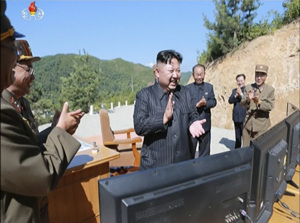Furious at the ICBM test earlier in the day by North Korea, the US and South Korea responded with a flurry of test fires of their own missiles, which they described as a “show of force” showing America’s capability to hit targets across North Korea in all weather conditions.
 Both China and Russia have urged North Korea and the US to both embrace a de-escalation plan that would see North Korea suspend missile tests in return for a moratorium on large US military exercises near North Korea. All signs are that this is a variation on past proposals already spurned by the US.
Both China and Russia have urged North Korea and the US to both embrace a de-escalation plan that would see North Korea suspend missile tests in return for a moratorium on large US military exercises near North Korea. All signs are that this is a variation on past proposals already spurned by the US.
South Korea had previously been seen to be behind such plans, but gave no such signs today, instead joining in the US “show of force,” while North Korea bragged about its successful ICBM test and insisted that they will have more “gift packages of missile tests” to come.
This sort of continued escalation on both sides only adds to concerns, repeatedly expressed by Russia and China, that the situation could rapidly spiral out of control, and lead to a massive war on the Korean Peninsula in very short order.


